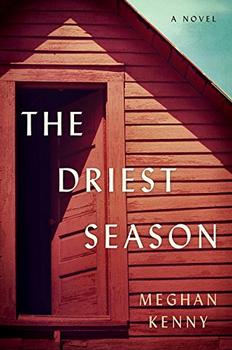Summary | Excerpt | Reviews | Beyond the Book | Readalikes | Genres & Themes | Author Bio

Chapter One
IN THAT DRIEST SEASON, Cielle's father hanged himself in the barn. A rope tied to a beam above stacked bales of hay, a wheelbarrow, rusted cans. Cielle found him. Home from summer school in the middle of July, and her legs couldn't move beneath her. She looked and didn't look. Her father hung still, bloated and blue. She thought of chickens, pigs, and hides of cows tied up and heavy-looking on ropes and hooks at the butcher's.
Cielle wasn't a child, nearly sixteen. She walked closer and touched his boot. Jesus. Sweet Jesus. She knelt before her father and thought for a moment he could fall. Light came in from rafter windows and cut long square shadows on wood plank walls. Then light shifted to dark from what she knew to be passing clouds. The barn was cool and damp. Sharp pebbles dug at her knees. She didn't look at his face again, or his hands, or all that was him outside of his clothing. Because it wasn't him right there, but something else, someone unrecognizable, and a memory she didn't want. Why had she gone into the barn? She never went in first thing after school. But that day she did and she couldn't remember the reason.
Their farm wasn't large, but it paid. It was a living. Wheat, corn, hay, oats, alfalfa, tobacco, chickens, pigs, and dairy cows. Their house was two hundred feet from the barn. Where was her mother? Helen, her sister, had gone to the lake. Cielle stood and touched his boot again. It floated above her shoulder.
"Daddy," she whispered.
She kept her eyes down and went to the house. The dirt road was dry and soft like flour. The red pickup truck was parked in front, and fresh garden radishes sat in a strainer in the kitchen sink. A pitcher of iced tea sat on the Formica table. She called for her mother, but there was no answer. She went out back into the garden, but no one was there. A breeze came through and rustled leaves. Cielle stood a moment at the door, expecting the world to stand still with her, but it didn't. Clouds like stretched gauze moved quickly above, the tire swing in the oak tree shifted, and its chains creaked.
She walked to the front yard. No one. But on the floor of the front porch, in neat order, was her father's wallet, his hat, a picture of her mother, of Helen, of herself, and of a young boy. On top of each photo was a heart-shaped stone. Stones they'd collected together at the lake. Their heart stones. Their hearts. She assumed the boy to be her father as a child, during a happier time. A time he wished he could go back to, before migraines. There was her family—lined up, paper on wood. The edges of the photos fluttered in the breeze.
—— ——
Her father had headaches. Cielle knew dust and pollen made them worse every year and that doctors said there was nothing to do for them but wait out the season. "How does a farmer wait out a season?" her father would say. "Do they expect I sit in the house with a wet towel over my face?" He said it hurt to walk. Felt his head was caving in. He'd moan deep and low at night, as if there were something inside him trying to push up and out. He'd writhe on the bed, on the floor. He'd hit his forehead with his fists, hoping to jar and get rid of the pain. Once he asked Cielle to rub his temples, asked her if she felt anything out of the ordinary.
"Nothing," she said. "Just your regular head."
"My head is pulsing. It's pressure all over. How is a farmer allergic to everything, Cielle? That's the sorriest thing I ever heard." .
—— ——
Cielle went upstairs and laid her satchel on her bed. From her window she saw the barn: faded red paint and stone; tall and long; dark windows. She leaned down, put both hands on her bed, and shut her eyes. That morning before school she'd collected chicken eggs. She'd scrubbed them with a damp nailbrush by the coop behind the barn and rinsed them in hot bleach-water. She'd set up a chair and small table and laid the eggs on a towel to dry. Her father had said it might be time to cut for hay, and he walked the field. He stood far off—they had one hundred acres, some of it wooded, but mostly fields—and he seemed small in the tall alfalfa. She could make out his hands on his head, as if he were holding himself together.
Excerpted from The Driest Season by Meghan Kenny. Copyright © 2018 by Meghan Kenny. With permission of the publisher, W. W. Norton & Company, Inc. All rights reserved.
We've heard that a million monkeys at a million keyboards could produce the complete works of Shakespeare...
Click Here to find out who said this, as well as discovering other famous literary quotes!
Your guide toexceptional books
BookBrowse seeks out and recommends the best in contemporary fiction and nonfiction—books that not only engage and entertain but also deepen our understanding of ourselves and the world around us.